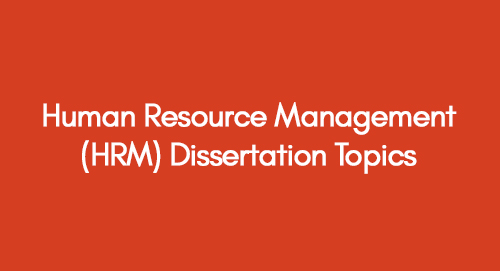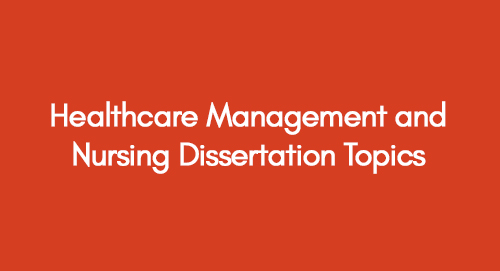
Fashion Dissertation Topics & Ideas 2025 | 155+ Free Topics
November 14, 2020
157+ Human Resource Management (HRM) Dissertation Topics in 2025
November 14, 2020Healthcare management is a field of study that elaborates on the administrative aspects of healthcare facilities. The maintenance of public health facilities is one of the fundamental duties of the government. Various students and researchers are keen to explore new healthcare management dissertation topics so they can play a vital role in improving healthcare services.
Healthcare Dissertation Examples
We have developed a list of 157+ exciting research topics in healthcare management in 2025.
Mental Health Dissertation Topics | Public Health Dissertation Topics
Emerging Healthcare Management Dissertation Topics in 2025
- Which leadership styles are most effective in improving healthcare service delivery?
- How does leadership impact patient satisfaction and safety outcomes?
- How do digital tools influence patient engagement and adherence to treatment plans?
- What challenges are faced by healthcare providers in adopting digital technologies?
- What are the most effective policy interventions to promote healthcare equity?
- How do socioeconomic factors influence the success of healthcare reforms?
- What factors contribute to high turnover rates among healthcare professionals?
- How can healthcare organisations improve staff morale and job satisfaction?
- What budgeting practices lead to better resource utilisation in hospitals?
- How can healthcare managers balance cost control with quality patient care?
Most Researched Healthcare Management Thesis Topics
Trending Research Topics in Healthcare
Top Grade Healthcare Management Research Topics
Healthcare Management Dissertation Topics For Undergraduate Students
Topic 38. Analysing the Role of Digital Health Records in Improving Patient Outcomes in NHS Hospitals: A Systematic Study
Topic 39. Evaluating the Effectiveness of Remote Patient Monitoring Technologies in Chronic Disease Management: A Quantitative Study
Topic 40. Examining the Impact of Artificial Intelligence in Enhancing Operational Efficiency in UK Healthcare: A Case Study
Topic 41. Assessing the Role of Mental Health Apps in Managing Anxiety Among University Students: A Qualitative Study
Topic 42. Understanding the Challenges of Integrating Telehealth in Rural Healthcare Systems: A Case Study
Topic 43. Exploring the Effectiveness of Patient Portals in Enhancing Healthcare Communication: A Systematic Study
Topic 44. Evaluating the Adoption of Blockchain in Healthcare Data Management: A Meta-Study
Topic 45. Analysing the Role of Wearable Devices in Preventive Healthcare Practices: A Quantitative Study
Topic 46. Examining the Influence of Leadership Styles on Staff Retention in Private Hospitals: A Case Study
Topic 47. Assessing the Impact of Public Health Campaigns on Vaccine Hesitancy Post-COVID-19: A Qualitative Study
Topic 48. Understanding the Effectiveness of Health Chatbots in Managing Outpatient Queries: A Systematic Study
Topic 49. Exploring the Cost-Effectiveness of Mobile Health Clinics in Urban Underserved Areas: A Quantitative Study
Topic 50. Evaluating the Integration of Mental Health Services in Primary Care Settings: A Case Study
Topic 51. Analysing the Impact of Staff Burnout on Patient Satisfaction in Emergency Departments: A Qualitative Study
Topic 52. Examining the Efficiency of AI-Powered Diagnostic Tools in Reducing Clinical Errors: A Systematic Study
Topic 53. Assessing the Role of Data Analytics in Predicting Patient Readmissions: A Meta-Study
Topic 54. Understanding Healthcare Workers’ Perceptions of AI Implementation in Hospital Management: A Qualitative Study
Topic 55. Exploring the Role of Community Health Workers in Reducing Hospital Re-Admissions: A Case Study
Topic 56. Evaluating the Accessibility of Mental Health Services Among Ethnic Minorities in the UK: A Quantitative Study
Topic 57. Analysing the Impact of Integrated Care Systems on Elderly Patient Wellbeing: A Systematic Study
Topic 58. Examining the Effectiveness of AI-Powered Scheduling Systems in Hospital Resource Management: A Case Study
Topic 59. Assessing the Outcomes of Hybrid Healthcare Delivery Models in Post-Pandemic Britain: A Quantitative Study
Topic 60. Understanding the Role of Leadership in Crisis Response During Healthcare Emergencies: A Qualitative Study
Topic 61. Exploring Digital Inclusion in Telehealth for Older Adults in the UK: A Case Study
Topic 62. Evaluating the Success of Public-Private Partnerships in Expanding Healthcare Access: A Meta-Study
Topic 63. Analysing the Role of Virtual Reality in Training Healthcare Professionals: A Systematic Study
Topic 64. Examining the Use of Predictive Modelling in Emergency Room Capacity Planning: A Quantitative Study
Topic 65. Assessing the Effectiveness of Social Prescribing in Reducing GP Workload: A Case Study
Topic 66. Understanding the Barriers to Implementing Green Policies in Healthcare Facilities: A Qualitative Study
Topic 67. Exploring the Role of AI in Supporting Mental Health Diagnostics: A Systematic Study
Topic 68. Evaluating Health Literacy Initiatives and Their Impact on Patient Empowerment: A Quantitative Study
Topic 69. Analysing the Efficiency of Supply Chain Management in Public Healthcare Institutions: A Meta-Study
Topic 70. Examining the Relationship Between Staff Training and Patient Safety Outcomes: A Case Study
Topic 71. Assessing the Impact of Cybersecurity Breaches on Patient Trust in Healthcare Systems: A Qualitative Study
Topic 72. Understanding the Use of Gamification in Promoting Health Behaviour Change Among Adolescents: A Quantitative Study
Topic 73. Exploring the Effectiveness of Online Support Groups for Long-Term Illness Management: A Case Study
Topic 74. Evaluating the Impact of NHS Workforce Shortages on Service Delivery Post-Brexit: A Systematic Study
Topic 75. Analysing the Benefits of Personalised Medicine in Oncology Management: A Meta-Study
Topic 76. Examining the Effectiveness of Cross-Sector Collaborations in Addressing Health Inequalities: A Case Study
Topic 77. Assessing the Role of Mobile Applications in Medication Adherence Among Young Adults: A Quantitative Study
Healthcare Management Dissertation Topics For Master's Students
Topic 78. Analysing the Impact of Artificial Intelligence on Clinical Decision-Making in Tertiary Care Hospitals: A Systematic Study
Topic 79. Evaluating the Role of Predictive Analytics in Reducing Emergency Department Wait Times: A Quantitative Study
Topic 80. Examining the Cost-Benefit Analysis of Telemedicine Implementation in Rural Healthcare Settings: A Case Study
Topic 81. Assessing the Effectiveness of Integrated Care Pathways in Managing Multimorbidity: A Meta-Study
Topic 82. Understanding Leadership Challenges in Post-COVID Public Health Policy Formulation: A Qualitative Study
Topic 83. Exploring the Application of Blockchain Technology in Enhancing Patient Data Security: A Systematic Study
Topic 84. Evaluating the Role of Digital Therapeutics in Managing Type 2 Diabetes: A Quantitative Study
Topic 85. Analysing the Effectiveness of Value-Based Healthcare Models in Improving Patient Outcomes: A Case Study
Topic 86. Examining the Ethical Implications of AI Deployment in Mental Health Assessments: A Qualitative Study
Topic 87. Assessing the Impact of Interdisciplinary Collaboration on Healthcare Service Efficiency: A Systematic Study
Topic 88. Understanding the Role of Remote Workforce Management in Healthcare Post-Pandemic: A Case Study
Topic 89. Exploring the Contribution of Big Data in Pandemic Surveillance and Response: A Meta-Study
Topic 90. Evaluating Patient Satisfaction in Hybrid In-Person and Virtual Primary Care Models: A Quantitative Study
Topic 91. Analysing Healthcare Managers' Preparedness for Climate-Related Health Crises: A Qualitative Study
Topic 92. Examining the Role of Digital Twins in Hospital Infrastructure Planning: A Systematic Study
Topic 93. Assessing the Effects of Personalised Healthcare on Oncology Patient Adherence: A Quantitative Study
Topic 94. Understanding the Challenges of Implementing AI-Powered Triage Systems in Emergency Units: A Case Study
Topic 95. Exploring the Relationship Between Healthcare Branding and Patient Loyalty in Private Hospitals: A Systematic Study
Topic 96. Evaluating the Financial Sustainability of Universal Health Coverage in Low-Income Countries: A Meta-Study
Topic 97. Analysing the Role of Human-Centred Design in Developing Digital Health Platforms: A Qualitative Study
Topic 98. Examining the Impact of Social Determinants on Health Equity in Urban Settings: A Case Study
Topic 99. Assessing the Potential of AI Chatbots in Managing Patient Appointments and Scheduling: A Quantitative Study
Topic 100. Understanding the Impact of Public Health Communication Strategies During Pandemics: A Meta-Study
Topic 101. Exploring the Use of Smart Wearables in Early Detection of Cardiac Conditions: A Systematic Study
Topic 102. Evaluating the Effectiveness of AI-Powered Diagnostic Support in Rural Clinics: A Case Study
Topic 103. Analysing Organisational Change Management in NHS Digital Transformation Projects: A Qualitative Study
Topic 104. Examining the Effectiveness of Cloud Computing in Enhancing Hospital IT Systems: A Systematic Study
Topic 105. Assessing Health Economics in the Adoption of Precision Medicine in the UK: A Meta-Study
Topic 106. Understanding the Effect of Virtual Leadership on Staff Performance in Healthcare Settings: A Case Study
Topic 107. Exploring the Role of Cultural Competency Training in Reducing Healthcare Disparities: A Qualitative Study
Topic 108. Evaluating Sustainability Metrics in Hospital Supply Chain Management: A Systematic Study
Topic 109. Analysing Risk Management Approaches in Large-Scale Health IT Projects: A Case Study
Topic 110. Examining the Role of Mobile Health Technologies in Managing High-Risk Pregnancies: A Quantitative Study
Topic 111. Assessing the Integration of Robotics in Surgical Departments Across Europe: A Systematic Study
Topic 112. Understanding Stakeholder Perceptions on Digital Consent Models in Electronic Health Records: A Qualitative Study
Topic 113. Exploring the Impact of Cross-Border Telemedicine on Health Access for Refugees: A Case Study
Topic 114. Evaluating Policy Effectiveness in Controlling Antimicrobial Resistance in Healthcare Facilities: A Meta-Study
Topic 115. Analysing the Use of Predictive Modelling in Managing Mental Health Resources: A Systematic Study
Topic 116. Examining Post-Pandemic Recovery Strategies in Health Workforce Planning: A Case Study
Topic 117. Assessing the Role of Interoperability Standards in Enhancing Global Health Data Exchange: A Systematic Study
Healthcare Management Dissertation Topics For Master's Students
Topic 118. Analysing the Long-Term Impact of AI Integration on Clinical Workflow Efficiency: A Meta-Study
Topic 119. Evaluating the Sustainability of Decentralised Healthcare Systems in Post-Pandemic Environments: A Systematic Study
Topic 120. Examining the Interrelationship Between Health Governance and Digital Health Policy Reforms in the EU: A Qualitative Study
Topic 121. Assessing the Economic Impacts of Genomic Medicine Integration into National Health Services: A Quantitative Study
Topic 122. Understanding the Influence of Ethical AI Governance on Patient Trust in Digital Health Platforms: A Case Study
Topic 123. Exploring the Potential of Global Health Diplomacy in Advancing Cross-Border Healthcare Access: A Systematic Study
Topic 124. Evaluating the Role of Quantum Computing in Advancing Predictive Healthcare Analytics: A Meta-Study
Topic 125. Analysing the Cost-Effectiveness of Blockchain-Based Medical Record Systems: A Quantitative Study
Topic 126. Examining Workforce Burnout in Global Healthcare Supply Chains Post-COVID-19: A Qualitative Study
Topic 127. Assessing the Viability of Space-Based Health Surveillance Systems for Global Pandemic Preparedness: A Systematic Study
Topic 128. Understanding the Role of Intersectionality in Health Disparities Across Marginalised Communities: A Meta-Study
Topic 129. Exploring the Impacts of Personalised Digital Health Coaches on Long-Term Chronic Disease Management: A Case Study
Topic 130. Evaluating the Influence of Smart Hospital Ecosystems on Administrative Cost Reductions: A Quantitative Study
Topic 131. Analysing Post-Crisis Health System Resilience through Multi-Level Governance Models: A Systematic Study
Topic 132. Examining the Role of AI in Epidemiological Modelling for Rare Disease Detection: A Meta-Study
Topic 133. Assessing the Long-Term Impact of Global Health Innovation Funds on LMIC Healthcare Infrastructure: A Case Study
Topic 134. Understanding the Ethical Challenges of Genomic Data Commercialisation in Precision Health: A Qualitative Study
Topic 135. Exploring the Implementation of Net-Zero Emissions Strategies in Public Health Facilities: A Systematic Study
Topic 136. Evaluating the Integration of AI-Powered Mental Health Tools in National Health Policies: A Case Study
Topic 137. Analysing Interoperability Challenges in Multi-Country Health Data Exchanges: A Qualitative Study
Topic 138. Examining the Role of Precision Public Health in Tackling Urban Health Inequalities: A Quantitative Study
Topic 139. Assessing the Efficiency of AI-Driven Fraud Detection Systems in Healthcare Insurance Management: A Systematic Study
Topic 140. Understanding Policy Gaps in the Regulation of Medical Metaverse Environments: A Qualitative Study
Topic 141. Exploring the Contribution of Machine Learning to Predictive Modelling in Mental Health Forecasting: A Meta-Study
Topic 142. Evaluating Public Perceptions of Risk Communication During Digital Health Crises: A Case Study
Topic 143. Analysing Governance Models for Global Vaccine Equity in Pandemic Preparedness Plans: A Systematic Study
Topic 144. Examining the Use of Federated Learning in Global Health Research Collaborations: A Qualitative Study
Topic 145. Assessing the Role of Healthcare Megaprojects in Reducing National Health Inequities: A Quantitative Study
Topic 146. Understanding the Ethical and Legal Implications of AI-Driven Clinical Decision Support Systems: A Case Study
Topic 147. Exploring the Long-Term Sustainability of PPPs in Healthcare Infrastructure Development: A Meta-Study
Topic 148. Evaluating the Impact of Immersive Reality Therapies in Neurodegenerative Disease Care: A Systematic Study
Topic 149. Analysing the Efficacy of ChatGPT-like AI Assistants in Enhancing Patient Health Literacy: A Quantitative Study
Topic 150. Examining Gendered Healthcare Leadership and Its Effect on Organisational Performance: A Qualitative Study
Topic 151. Assessing the Outcomes of Universal Health Data Integration Policies on Health Equity: A Case Study
Topic 152. Understanding the Impacts of Virtual Reality Simulation Training on Surgical Performance: A Meta-Study
Topic 153. Exploring the Economic Feasibility of Global Disease Elimination Programmes in 2025: A Quantitative Study
Topic 154. Evaluating the Effectiveness of AI-Driven Medical Device Regulation in Enhancing Patient Safety: A Systematic Study
Topic 155. Analysing Stakeholder Engagement Models in Sustainable Health Innovation Ecosystems: A Case Study
Topic 156. Examining the Intersection of Cybersecurity and Patient Safety in Digital Health Environments: A Qualitative Study
Topic 157. Assessing Post-COVID Transformation Strategies in Health Insurance Systems: A Meta-Study
The Crucial Role of Thoughtful Topic Selection in Healthcare Management Dissertations
Choosing good healthcare management dissertation topics is crucial. They form the basis for impactful research in the healthcare sector. A well-chosen topic shapes the trajectory of academic inquiry. Researching diabetes allows for focused investigation into a prevalent health concern while exploring infectious disease or global health research topics opens avenues for valuable insights in healthcare management.
Review the Full List of Dissertation Topics
For more research topics in healthcare management, please keep visiting our website as we keep updating our existing list of topics.
Good luck!
Get 3+ Free Healthcare Management Dissertation Topics within 24 hours?


























